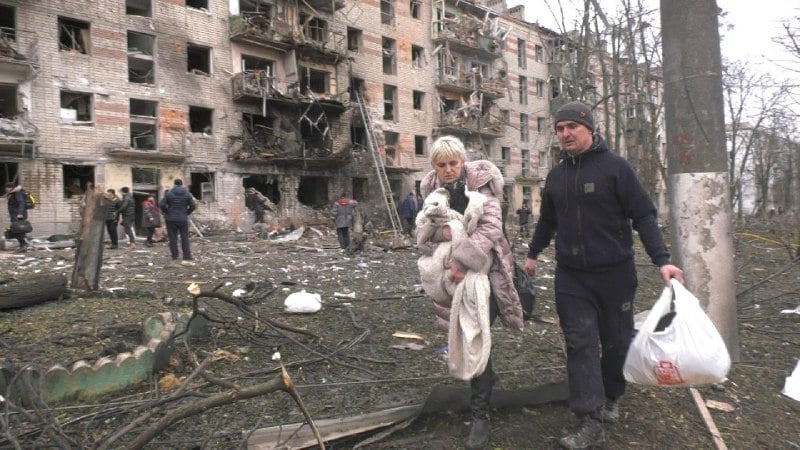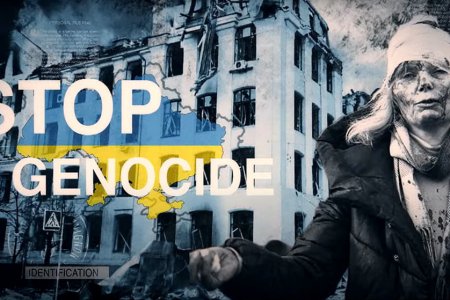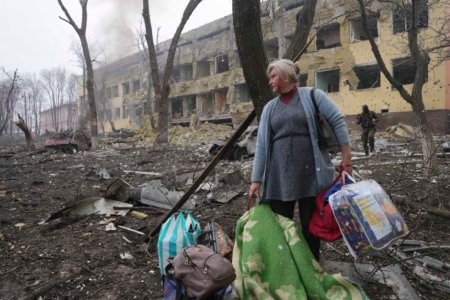
Amnesty International issued a press release on 4 August asserting that “Ukrainian fighting tactics endanger civilians”. In this document, Agnès Callamard, Amnesty International’s Secretary General states that “we have documented a pattern of Ukrainian forces putting civilians at risk and violating the laws of war when they operate in populated areas.” It is not clear where this has been documented, nor why, if a full report is to be provided, it was not published together with the press release. It rapidly also became clear that “we” in this case did not include the Ukrainian branch of AI which had objected from the outset, and whose Director, Oksana Pokalchuk has now resigned as a result.
Callamard has since accused those she calls “Ukrainian and Russian social media mobs and trolls” of attacking AI “investigations. This is called war propaganda, disinformation, misinformation.”
‘Trolls’ are normally anonymous, whereas in this case, the only anonymous people are the “Amnesty International researchers” mentioned. As well as Oksana Pokalchuk, there have been strong comments from at least two warfare specialists (Jack Watling, John Spencer) who criticize the report for its “weak understanding of the laws of armed conflict”, the British Ambassador to Ukraine Melinda Simmons, a former Ukrainian Deputy Prosecutor General, Gyunguz Mamedov and Oleksandr Pavlichenko, Director General of the Ukrainian Helsinki Human Rights Union. The two latter are directly involved in work on documenting war crimes.
AI Press Release
AI asserts that “Ukrainian forces have put civilians in harm’s way by establishing bases and operating weapons systems in populated residential areas, including in schools and hospitals.” The text goes on to claim that such tactics … “turn civilian objects into military targets. The ensuing Russian strikes in populated areas have killed civilians and destroyed civilian infrastructure.”
While claiming that this has been “documented”, AI does not provide a single specific example. This makes it difficult to fathom which of Russia’s relentless attacks on Ukrainian civilian targets since 2022 are being described as “ensuing Russian strikes” (blamed on Ukraine’s fighting tactics), and which are the “certain other locations” where AI acknowledges that Russia has committed war crimes by unlawfully targeting civilian areas. AI itself only mentions “some areas” of Kharkiv for the latter category.
The same misleading suggestion of some kind of cause and effect situation is seen in the paragraphs about schools. AI states that “at 22 out of 29 schools visited, Amnesty International researchers either found soldiers using the premises or found evidence of current or prior military activity.”
AI then goes on to say that “Russian forces struck many of the schools used by Ukrainian forces. In at least three towns, after Russian bombardment of the schools, Ukrainian soldiers moved to other schools nearby, putting the surrounding neighbourhoods at risk of similar attacks.”
Russian missile strikes and shelling have damaged, sometimes totally destroyed, hundreds of Ukrainian schools. If AI has information showing that Ukraine’s treatment of 22 schools out of 29 was inappropriate, it should demonstrate this. It should not, however, create a thoroughly erroneous impression that suits only Russia’s propaganda narrative.
In general, if AI’s researchers think they know something that the International Criminal Court and independent Ukrainian researchers are unaware of, they should surely provide it now, rather than first issuing a press release and then accusing its critics of “war propaganda and misinformation”.
It was Jack Watling, Senior Research Fellow on Land Warfare and Military Sciences at the Royal United Services Institute, who criticized AI for its “weak understanding of the laws of armed conflict”. He points out that “it is not a violation of IHL [international humanitarian law} for Ukrainian military personnel to situate themselves in the terrain they are tasked to defend rather than in some random piece of adjacent woodland where they can be bypassed.” In agreeing, John Spencer, Chair of Urban Warfare Studies, Madison Policy Forum, and a former US Army major, accused AI of “not understanding and dangerously misinterpreting the Law of Armed Conflict and IHL”, as well as of “not understanding the nature of the war in Ukraine, the goals of both sides….”
Callamard would presumably stop short of calling Melinda Simmons, British Ambassador to Ukraine, a ‘troll’. The latter’s response to AI’s press release was as follows: “The only things endangering Ukrainian civilians are Russian missiles and guns and marauding Russian troops. Full stop. If Russia stopped invading Ukraine, there would be no danger”.
Again citing their apparently documented cases, AI asserts that they are not aware of any efforts by the Armed Forces to evacuate civilians from neighbouring buildings. All of those closely following events over the past five months will be aware how regional governors have repeatedly called on the population to evacuate, and provided buses for them to do so, warning of the danger if they remained. This does not mean that those who ignore such warnings should be put in danger, if this can be avoided, but openly making efforts to first of all remove civilians, in the middle of a military conflict, may well put all lives at risk, both civilians and of the Ukrainian military defending the country against a powerful and ruthless aggressor state.
If AI chose not to cooperate with the Ukrainian Amnesty office on the assumption that the latter was somehow ‘biased’, it may well also ignore the views, and the findings, of other Ukrainians, like Gyunguz Mamedov, who was until the middle of 2021 the Head of Ukraine’s Department for overseeing criminal proceedings into crimes committed in conditions of military conflict [otherwise known as the War Department]. Referring, in the absence of any enclosed report, to the press release, Mamedov writes that this “new report has effectively demonstrated that theorizing about war is often at odds with reality. No analysis can fail to take context into account. And this [context] is that all international crimes on Ukrainian territory have become possible as a result of Russia’s aggression. Ukraine, accordingly, as a side in the conflict has a total right to defend itself. Furthermore, it is not we, as victim of aggression, that chose the theatre for military action. The attacks on Ukrainian cities are the conscious choice of the armed forces of the Russian Federation. “
Mamedov stresses that “each fact of a possible violation of the norms of international humanitarian and criminal law, including by Ukrainians, should be studied in detail and investigated. However an unequivocal assertion that Ukraine’s Armed Forces are using human shields as a tactic is unwarranted and premature, and will serve as a weapon in the information war.”
“Perhaps in conditions of the full-scale aggression when the full might of the Russian Federation’s military machine is directed against Ukraine, it would be worth independent international organizations using more verified and weighty facts rather than presumptions? Instead, the report does not contain proper evidence, making it impossible to consider each episode on its merits.”
Oleksandr Pavlichenko, Executive Director of the Ukrainian Helsinki Human Rights Union [UHHRU] speaks as though “the report” is not yet available, but says that the press release itself arouses questions. He notes that both UHHRU and the Initiative Tribunal For Putin have been documenting war crimes since 2014. Since the beginning of the full-scale invasion, they “have documented over 14 thousand war crimes and all of them pertain to russia which is committing them on Ukrainian territory. At the same time, we look at all cases where such war crimes may be committed, and for some reason we view the situation differently from Amnesty International.
We know of cases which can arouse doubts as to whether all norms have been complied with however in such cases Ukraine is carrying out an investigation. “
Pavlichenko points out that there have been no comments (casting doubt about their findings) from the investigators from the International Criminal Court, nor from other international organizations, with whom they cooperate. “That is confirmation that Amnesty International have somewhat infringed balance in presenting material and facts, in this way helping our enemies in their information war.”
“I have a very simply proposal: if there are assertions regarding crimes committed by Ukraine, prepare your report with factual substantiation and turn to international bodies, like the International Criminal Court.”
“Russia is committing the crime of aggression. This is one of the forms of war crimes. Russia is the aggressor state and Ukraine a country which is defending itself against the aggressor. It is Ukraine’s prerogative to determine how it defends itself and where, what tactics it adopts, and opportunities.”
Amnesty International in Ukraine
Soon after publication of the press release, the team from AI in Ukraine issued a statement in Ukrainian on Facebook. This indicated that the Ukrainian office had not been involved, either in preparing, or in writing the publication and that the team’s arguments “about the inadmissibility and incompleteness of such material” had not been taken into account. The Ukrainian office had also refused to publish the press release on their site or translate it into Ukrainian due to what they saw as its one-sidedness.
“Each person from the Ukrainian office of Amnesty knows that it is specifically the russian federation that is responsible for the crimes of aggression against Ukraine.”
On 5 August, Oksana Pokalchuk announced that she was resigning, and said that she had run up against a wall of bureaucracy and a thick “language barrier”. This, she stressed, did not lie in the English language, but “in the fact that if you don’t live in a country which has been invaded by occupiers and ripped to shreds, you probably can’t understand what it means to condemn the army of defenders. And there are no words in any language which are capable of conveying that to those who have not felt this pain.”
All her team in the Ukrainian office had constantly insisted that the press release should, at very least, investigate both sides and take into account the position of Ukraine’s Ministry of Defence. AI did finally turn to the Ministry, but gave them very little time for a response (the press release states that they contacted the Ministry on 29 July, with the press release made public on 4 August.
“As a result of this, without wanting it, the organization has created material which sounded like support for Russian narrative. Seeking to defend civilians, this study has instead become a tool of Russian propaganda.”



